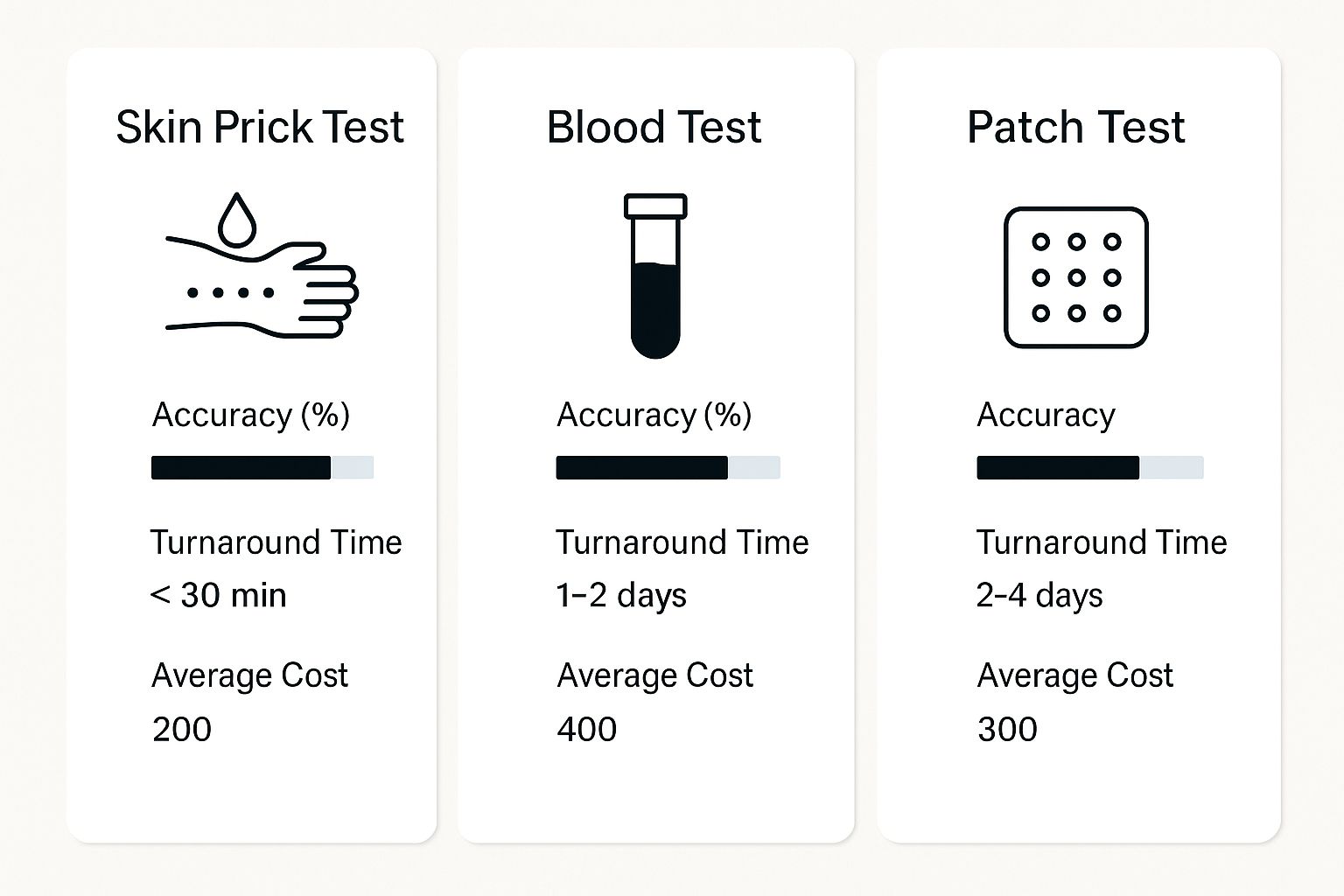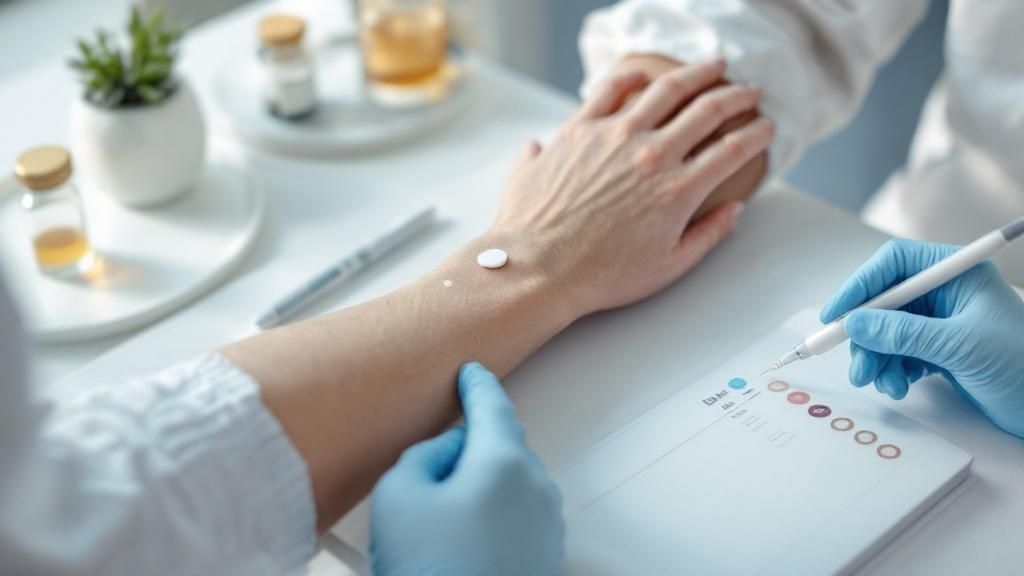If you’re constantly battling sniffles, unexplained rashes, or digestive troubles in Dubai, getting an allergy test in Dubai can provide the clear answers you need for relief. The city's unique environment, from desert dust to pervasive air conditioning, often triggers sensitivities that are nearly impossible to identify on your own. This guide will walk you through everything you need to know about allergy testing options in Dubai.
Why Dubai's Environment Makes Allergy Testing Crucial

Living in Dubai is a remarkable experience, but its distinct environmental factors can awaken or worsen allergies. Many residents find themselves dealing with symptoms they never had before, turning a normal day into a frustrating battle. Understanding Dubai’s specific environmental triggers is the first step toward effective management and feeling better.
The blend of rapid urban development and a desert climate creates a unique atmospheric challenge. Fine sand and construction dust are constant, carrying tiny particles that can irritate the respiratory system. This isn't just a minor annoyance; for many, it is a persistent trigger for allergic rhinitis, asthma, and skin conditions, making an allergy test in Dubai a critical diagnostic tool.
Common Indoor and Outdoor Allergy Triggers in Dubai
Due to Dubai's hot climate, residents spend significant time indoors with air conditioning. While essential for comfort, AC systems can circulate common allergens like dust mites, mould spores, and pet dander, especially if not perfectly maintained. This creates an indoor ecosystem where allergens can thrive year-round.
Step outside, and a different set of challenges awaits. Beyond the desert dust, the city's beautiful parks and green spaces introduce seasonal pollens from various trees and grasses—classic triggers for hay fever.
These factors contribute to a growing demand for accurate allergy diagnostics. The UAE's allergy diagnostics market has seen significant growth, driven by the rise in allergic diseases linked to modern lifestyles and environmental exposures. A key challenge is the diverse range of local allergens, which complicates the development of perfectly matched diagnostic tests. You can explore more about these market trends and their implications for healthcare in the region.
An allergy test acts as a roadmap for your immune system. Instead of guessing the cause of your symptoms, it provides specific data, empowering you to make informed decisions about your diet, home environment, and lifestyle.
Why Self-Diagnosis Is Not Enough
Trying to pinpoint your allergy triggers on your own is like searching for a needle in a haystack. Is it the dust? The seafood from dinner? The pollen from a nearby park? This guessing game often leads to unnecessary anxiety and the elimination of foods you may not be sensitive to.
An allergy test in Dubai eliminates this confusion by providing clear, scientific answers about your body's reactions. This is crucial because what seems like a minor sniffle could be your body signalling a more significant sensitivity.
A professional diagnosis helps you:
- Identify Specific Triggers: Pinpoint exactly which substances—from food to environmental particles—are causing your symptoms.
- Create a Targeted Management Plan: Work with your doctor to develop a strategy that actually works, involving avoidance, medication, or other treatments.
- Improve Your Quality of Life: Break the cycle of chronic symptoms and regain control over your health and comfort.
Decoding Your Allergy Test Options in Dubai
Deciding to get an allergy test in Dubai is a significant first step, but choosing the right one can feel overwhelming. Fortunately, the process is simpler than it seems. A doctor will typically recommend one of two main methods to uncover your triggers: a skin test or a blood test.
Each method acts like a different type of detective, searching for the same culprits but using distinct evidence-gathering techniques. Understanding how they work will help you feel more prepared for your diagnostic journey.
The Skin Prick Test (SPT): A Direct Conversation with Your Skin
The most common method is the skin prick test (SPT). Think of it as a direct, real-time conversation with your immune system on the surface of your skin. It is a highly effective way to check for immediate allergic reactions to dozens of potential allergens at once.
During the test, an allergist applies tiny drops of purified liquid allergens—such as pollen, mould, pet dander, or food extracts—to your arm or back. A small, sterile probe is then used to gently prick the skin's surface through each droplet. This is not an injection but a light scratch that feels like a quick poke.
If you are allergic to a substance, your skin will react quickly. Within 15-20 minutes, a small, raised, reddish bump resembling a mosquito bite will appear. This reaction, called a wheal, is a clear sign that your body has produced IgE antibodies against that specific allergen.

While skin tests provide rapid answers, blood tests are an excellent alternative, particularly if certain skin conditions or medications are a factor.
The IgE Blood Test: A Detailed Analysis of Your Bloodstream
A skin prick test isn't suitable for everyone, which is where the Immunoglobulin E (IgE) blood test comes in. This test involves a lab analysis of a blood sample to search for specific clues related to your allergies.
The test measures the amount of allergen-specific IgE antibodies in your bloodstream. Instead of a visible skin reaction, the lab identifies which antibodies your immune system has developed to fight particular allergens. A high level of IgE antibodies to substances like peanuts or dust mites is a strong indicator of an allergy.
An IgE blood test is the preferred choice if you have a severe skin condition like eczema or psoriasis, or if you are taking medications (like antihistamines) that would interfere with skin test results. It is also a safer option for individuals with a history of severe anaphylactic reactions.
To help you understand the differences, here is a breakdown of these two powerful diagnostic tools.
Skin Tests vs. Blood Tests: A Quick Comparison
The table below provides a straightforward comparison to help you understand how each allergy test in Dubai works and which might be better suited for your situation.
| Feature | Skin Prick Test (SPT) | IgE Blood Test |
|---|---|---|
| How It Works | A tiny amount of allergen is pricked into the skin's surface. | A blood sample is drawn and analysed in a lab for IgE antibodies. |
| Results Time | Very fast. Results are visible in just 15-20 minutes. | Slower. It takes a few days to receive lab results. |
| Best For | Quickly identifying common environmental and food allergies. | People with skin conditions or those on interfering medications. |
| Discomfort Level | Minimal. Feels like a light scratch or poke. | A standard blood draw from a vein. |
| Accuracy | Highly accurate for most common immediate allergies. | Very reliable and not affected by medications like antihistamines. |
Ultimately, both tests are excellent for identifying the source of allergic reactions. The right choice for you depends on your individual health profile and medical history.
Differentiating Between Allergies and Intolerances
It is crucial to understand that these tests detect true IgE-mediated allergies, which are an immune system response. They are different from tests for food intolerances, which are typically digestive issues and do not involve the same antibody reaction.
If you suspect your symptoms are related to how your body processes certain foods, it may be beneficial to explore a food intolerance test in Dubai.
You don’t have to make this decision alone. An allergist will review your symptoms, medical history, age, and skin condition to recommend the most appropriate allergy test in Dubai for you, ensuring the most accurate diagnosis possible.
How to Prepare for Your Allergy Test Appointment

Preparing for your allergy test is a simple yet crucial step that significantly impacts the accuracy of your results. A little preparation ensures your appointment at a Dubai clinic is productive, facilitating a clear discussion with the specialist and streamlining the entire process.
Think of it as partnering with a detective; the more clues you provide, the faster your allergist can solve the mystery behind your symptoms. A few simple steps are all it takes to set yourself up for a successful allergy test in Dubai.
The Most Important Step: Medication Management
If you are scheduled for a skin prick test, the most critical preparation step is to temporarily stop certain medications—especially antihistamines. These common allergy medications work by blocking the very reactions the test aims to trigger. Taking them beforehand would be like testing a fire alarm after removing its batteries; you won't get a clear signal.
Most antihistamines must be stopped for 3-7 days before your appointment. This includes over-the-counter tablets for hay fever, colds, or itching.
However, this is not a decision to make on your own.
Always consult with your doctor or the allergy clinic before stopping any medication. They will provide precise instructions based on your specific medications and health history, ensuring both your safety and the accuracy of the test.
If you are scheduled for a blood test, this step is usually unnecessary, as antihistamines do not affect IgE antibody levels in your blood. For maximum convenience, you can also explore services for blood tests at home in Dubai.
Documenting Your Symptoms and Potential Triggers
Your personal experience is one of the most valuable tools in this process. Before your clinic visit, take some time to track your symptoms. A simple log in a notebook or on your phone is sufficient.
This journal helps your doctor identify patterns that may not be obvious to you. A detailed history can significantly speed up the diagnostic process.
Try to track these key details:
- Symptom Details: What are your specific symptoms? (e.g., itchy throat, hives, stomach cramps, runny nose).
- Timing and Frequency: When do your symptoms appear? (e.g., after meals, in the morning, during certain seasons).
- Potential Triggers: What were you doing just before the symptoms started? Note down foods, activities, or locations.
- Relieving/Aggravating Factors: Did anything make you feel better (like an air-conditioned room) or worse?
Practical Tips for Your Appointment Day
Once your medication is managed and your symptom log is ready, a few small practical steps can ensure a stress-free appointment day. Simple planning for your allergy test in Dubai goes a long way, especially for a skin prick test.
Keep these final points in mind for a smooth experience:
- Wear Comfortable, Accessible Clothing: A loose top with sleeves that can be easily rolled up is ideal, allowing the allergist easy access to your arm or back.
- Avoid Lotions and Creams: Do not apply any moisturisers or creams to your arms or back on the day of the test, as they can create a barrier on your skin and interfere with the results.
- Prepare Your Questions: Write down any questions you have about your symptoms, the test, or potential treatments. This is your opportunity to get expert advice.
How At-Home Allergy Testing Works in Dubai
Life in Dubai can be fast-paced, making it difficult to find time for clinic visits. At-home allergy tests offer a modern, convenient solution to get answers about your health from the comfort of your home. This is a game-changer for anyone seeking to understand their body's triggers without disrupting a busy schedule.
Forget clinic queues and waiting rooms. With an at-home allergy test in Dubai, a simple kit is delivered to your door. It contains everything you need to start the process in a private, familiar setting that fits your timetable.
What might seem complex is broken down into a few manageable steps, starting with ordering a kit focused on the allergens you want to investigate.
The At-Home Collection Process Step by Step
Once your kit arrives, you will find the sample collection process surprisingly straightforward. It’s like a mini science experiment you can do from your living room, with clear instructions guiding you.
The core of most at-home allergy tests is a simple finger-prick blood sample. It's far less intimidating than a traditional blood draw and requires only a small amount of blood.
Here’s a typical breakdown of the process:
- Order Your Kit: Select and order the appropriate test online from a trusted Dubai provider.
- Prep Your Area: Find a clean, comfortable spot. Wash your hands thoroughly with warm water to increase blood flow to your fingertips.
- Collect the Sample: Use the sterile lancet included in your kit to make a quick, small prick on the side of your fingertip.
- Fill the Collection Device: Gently squeeze your finger to collect a few drops of blood in the provided micro-container or on the collection card.
- Package It Up: Secure the sample in the prepaid, bio-safe packaging. It is designed for safe and sterile transport back to the lab.
The entire collection process usually takes no more than 10-15 minutes. It's a simple way to take an active role in your healthcare. If you're interested in other health screenings, you can learn more about how a lab at home in Dubai can simplify the process.
From Your Home to the Laboratory
After collecting and sealing your sample, the next step is sending it to the lab. Most at-home testing services in Dubai offer seamless courier pickup. Simply schedule a time, and your sample will be transported to a certified laboratory without you leaving home.
There, skilled technicians analyse your blood for specific IgE antibodies—the same process used for a clinic-drawn sample. The scientific standards are identical; only the collection location has changed. This ensures you receive accurate, reliable results you can trust.
At-home testing bridges the gap between convenience and clinical accuracy, making diagnostics more accessible and allowing more people to get the answers they need without logistical hassles.
Receiving and Understanding Your Results
In just a few days, your results will be ready. Instead of waiting for a paper report, you will receive an email notification with access to a secure online portal. There, you’ll find a detailed breakdown of your sensitivities to all tested allergens.
These reports are designed for clarity, often using colour-coded charts to show your reactivity level to each substance, from low to high. This visual format helps you quickly identify your main triggers.
However, a report is just data. The most crucial step is what follows. Reputable at-home testing services include a telehealth consultation with a doctor or allergy specialist. This conversation is essential for translating your results into a practical action plan, ensuring you fully understand what your sensitivities mean and how to manage them effectively.
Turning Your Allergy Test Results Into an Action Plan

Receiving your allergy test results is a significant milestone, but it's just the beginning. The report is a personalised map of your immune system’s triggers. The real work starts now: turning that map into a practical strategy for daily well-being.
This is why a professional consultation is essential. Whether you used an at-home kit or visited a clinic in Dubai, discussing your results with an allergist or a qualified doctor is non-negotiable. They are the experts who can translate raw data into an accurate diagnosis and prevent you from jumping to incorrect conclusions.
A positive result for an allergen doesn't automatically mean a severe reaction every time, just as a negative result doesn't completely rule out a sensitivity. A specialist will analyse these findings alongside your symptom history to build a complete picture.
Building Your Personalised Management Strategy
After interpreting your results, your doctor will help you create a personalised action plan. This is not a generic handout; it's a strategy tailored to your specific triggers, lifestyle, and goals, aimed at reducing symptoms and improving your quality of life.
Your plan will likely include several key components:
- Allergen Avoidance: The cornerstone of any allergy plan. If you're allergic to dust mites, you'll receive tips for managing your home, like using allergen-proof bedding. For a food allergy, it involves learning to read labels and communicate your needs when dining out.
- Dietary Adjustments: For food sensitivities, an elimination diet may be recommended to identify and remove problem foods without sacrificing key nutrients, which can help calm your digestive system.
- Symptom Management with Medication: Your doctor might suggest antihistamines for milder reactions or prescribe an epinephrine auto-injector for severe allergies. For those needing consistent support, our guide on arranging professional nursing services at home offers valuable information.
This initial plan provides immediate relief and helps you manage daily life. For those seeking a more permanent solution, advanced treatments are available.
Exploring Long-Term Relief With Immunotherapy
For many people with persistent environmental allergies, avoiding triggers is not always practical. This is where a transformative treatment called allergen immunotherapy (AIT) can help. Think of it as retraining your immune system to stop overreacting to allergens like pollen or dust.
Allergen immunotherapy addresses the root cause of the allergy rather than just masking symptoms. Over time, it can dramatically reduce or even eliminate allergic reactions, offering long-lasting relief.
The treatment involves exposing your body to tiny, controlled doses of the allergen over time, either through injections (SCIT) or under-the-tongue drops/tablets (SLIT). This gradual exposure helps your body build tolerance.
The need for effective long-term solutions is growing. Allergic rhinitis (AR) cases are rising in the UAE, with projections showing that each specialised allergy clinic could diagnose over 150 new AR patients annually by 2025. UAE experts recommend AIT for at least three years to achieve lasting results. You can read more about these regional allergy trends and treatment guidelines.
An allergy test in Dubai is your first step toward this kind of transformative care. By working with a doctor to turn your results into a clear action plan, you can move beyond managing symptoms and build a foundation for long-term health.
Common Questions About Allergy Testing in Dubai
Taking the first step to get an allergy test in Dubai is a great move for your health, but it often brings up questions about cost, insurance, safety for children, and accuracy. Getting clear answers to these practical concerns will help you move forward with confidence.
This section addresses the final details to complete your understanding of allergy testing in Dubai.
How Much Does an Allergy Test Cost in Dubai?
The cost of an allergy test in Dubai varies based on the number of allergens tested, the technology used, and the clinic or lab.
Here is a general cost estimate:
- Skin Prick Tests: A standard panel for common food and environmental triggers typically ranges from AED 800 to AED 2,000.
- Blood Tests (IgE): These can be more extensive, with costs starting from AED 1,500 and going up to AED 4,000 or more for specialized panels.
- At-Home Test Kits: Prices vary widely depending on the comprehensiveness of the kit.
It's always wise to contact the provider directly for an exact quote before booking to avoid surprises.
Is Allergy Testing Covered by Health Insurance?
Insurance coverage for allergy testing in Dubai depends on your specific plan. Most comprehensive health insurance policies cover diagnostic tests deemed medically necessary by a doctor. If your GP or a specialist recommends an allergy test to investigate your symptoms, it is likely covered. However, basic plans may not include this type of testing.
Our Pro Tip: Call your insurance provider before scheduling your test to confirm coverage. Inquire about any co-payment requirements and whether pre-authorisation is needed. A quick phone call can save you from unexpected costs.
Can Children Be Tested for Allergies?
Yes, allergy testing is safe and common for children, including infants and toddlers showing early signs of allergic reactions. Paediatric allergists in Dubai are skilled at making the process as comfortable as possible for young patients.
The type of test used depends on the child and their symptoms:
- A skin prick test is popular for its immediate results, which is beneficial when dealing with children.
- A blood test is a great alternative if the child has a skin condition like eczema that could interfere with skin testing, or if they cannot stop taking antihistamines.
If your child has persistent rashes, a chronic runny nose, or digestive issues after eating, consulting a paediatric specialist is the best first step. For families who prefer the comfort of home, a home doctor visit in Dubai offers a convenient way to get an initial assessment in a familiar setting.
How Accurate Are Allergy Tests?
When performed and interpreted by a qualified specialist alongside your medical history, both skin and blood tests are highly accurate diagnostic tools.
It's important to understand what "accurate" means in this context:
- Skin prick tests are highly sensitive and excellent for identifying immediate allergic reactions to substances like pollen, dust mites, and many foods.
- IgE blood tests are also very precise at detecting specific allergy antibodies in your blood.
No single test is 100% perfect on its own. A positive result indicates that your body is "sensitised" to an allergen, but it doesn't guarantee a reaction upon every exposure. Similarly, a negative result doesn't completely rule out an allergy. This is why a follow-up consultation with your doctor is crucial. They connect the test results with your real-life symptoms to provide an accurate diagnosis and a practical plan for relief.
Ready to get the clear answers you need to improve your health? The team at Call To Doctor is here to make your journey to relief as simple and convenient as possible. We offer professional at-home allergy testing services across Dubai, bringing expert care directly to your doorstep.



Leave a Reply